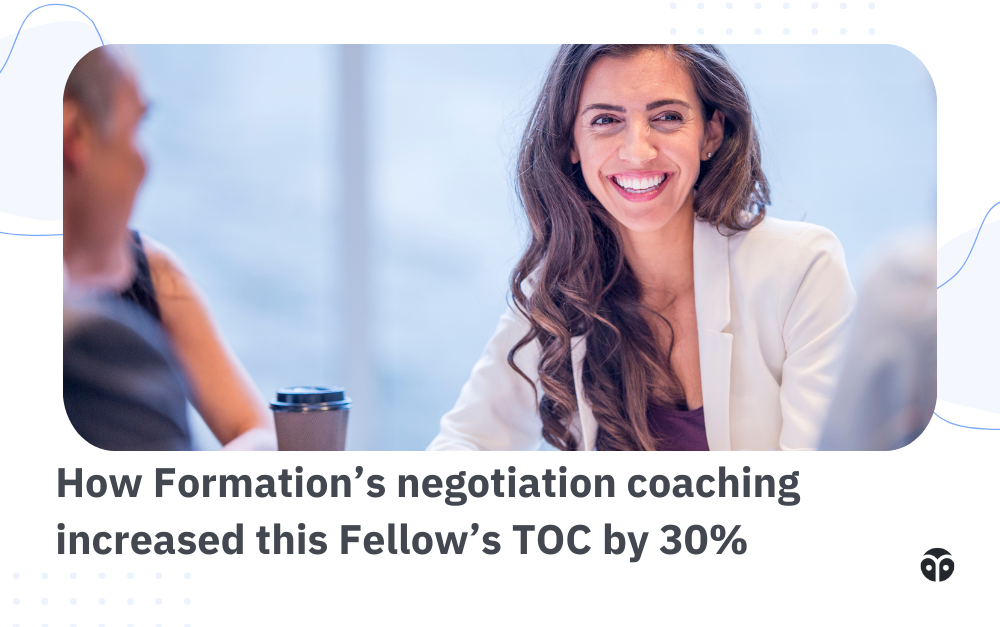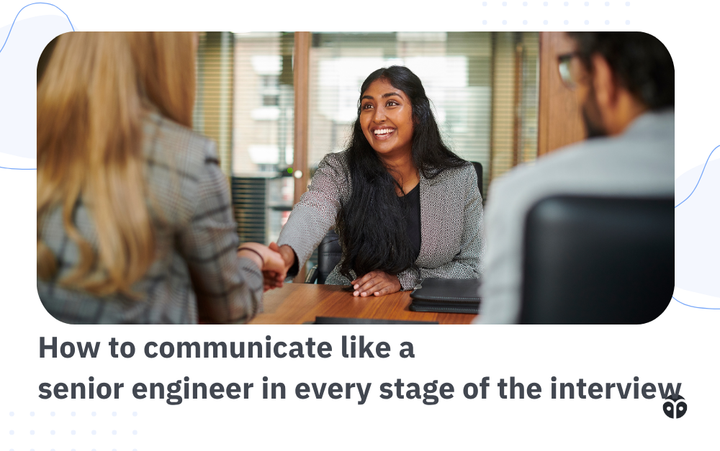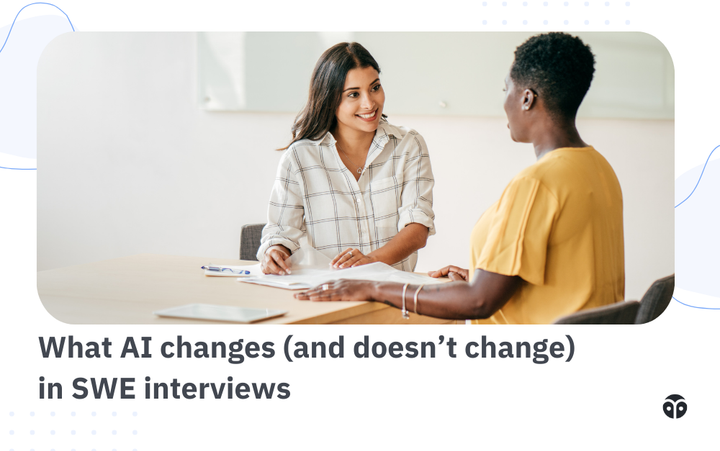How Formation’s negotiation coaching increased this Fellow’s TOC by 30%
Learn how Formation's negotiation support helped one software engineer negotiate a 30% increase in total comp during the hiring process.

Formation’s Fellowship empowers software engineers with extensive 1:1 training, unlimited mock interviews, and career coaching. Participants gain access to support from a team of hundreds of FAANG-level engineering mentors, technical recruiters, career coaches, and more. This support is available from the start of their job search, through negotiations, and into the acceptance of an offer.
Recently, a Fellow in our Fellowship encountered a unique situation during the offer stage of their interview process. Our team was able to help them through negotiations and secure a 30% increase in total compensation.
Here’s how they did it and the lessons you can learn from their experience.
Setting the stage: A talented engineer with multiple offers
After this individual took full advantage of all Formation offers, including mock interviews with interviewers previously employed at their target companies, they found themselves with three solid offers from FAANG companies.
One of the offers this individual received was significantly lower than what another Fellow received for the same role, with the same type of experience, during the same time frame. The team quickly realized that this particular individual had received the lowest possible offer in the pay band for that role.
How negotiations work: Why they received a lower offer than their peer
Here’s why we think this happened.
A core tenet of Formation’s approach to negotiation is to give no indication of the pay you’re looking for before receiving an offer. During conversations with the recruiter, we encourage Fellows to reply to questions like “What pay range do you have in mind?” with a vague answer like, “I expect a competitive offer aligned with my level and experience.” The recruiter is asking because they want to make sure the role is in the right range. We advise a vague answer so that you don’t accidentally set an expectation of a lower number than you could otherwise be eligible for.
This Fellow followed these instructions exactly. They gave no indication of what they were looking for, avoiding pigeon-holing themselves into a lower pay than what might have been offered otherwise. The Fellow who received the higher offer had indicated the pay range they sought.
From a business perspective, it’s the recruiter's job to get people to join a company for the lowest possible total compensation that you’re happy with signing while maintaining a positive relationship and representation of the company. It’s not personal; it’s just how business works. Since this Fellow didn’t indicate desired compensation, the company responded by throwing out the lowest possible initial offer. The company fully expected a counteroffer.
Setting Fellows up for a successful negotiation
We tell Fellows that when a recruiter calls you with good news, listen to the offer and write everything down. Don't say anything like, "I accept the offer," "This looks good," or "I'm ready to move forward." Respond with a very appreciative, "Thank you for this offer. I will look at it offline and come back to you." And that's it.
The recruiter might try to get a signal because they want to know if they're close to the right compensation range. They might say something like, "How are you feeling about this?" or they might say, "This is one of the best offers I could get you. I just want to let you know that this is a really good offer." Ignore all that and just write down the offers. Show appreciation, but don't indicate how you feel about it.
This Fellow followed those instructions perfectly and brought our team the offer. We immediately knew it was incredibly low, but we dug into the data to determine how low.
The power of data-backed counteroffers
Many times, we’ll have Fellows come to us and say they found data on a particular website and want to use that information for a counteroffer. We look at that same data, but we interpret it differently. What they found might not be as relevant as they think.
It’s important to look for the most recent real-time offers in the same location, at the same job level, and with the same exact experience background. Look for another person who will be in the same office at the same level and has one less year of experience—that’s your benchmark.
In addition, companies can vary a lot in their offer structure. For example, some companies give stock grants over four years pegged to dollar values, others a number of shares, and others give more complex cash bonus structures over a number of years. It's really hard to summarize the intricacies of an offer on a website, and as people submitting the data interpret it differently, there can be mistakes and errors.
The reasons for a counteroffer
To negotiate well, you have to come to the table with a data-backed reason for your counteroffer.
Grounds for counteroffers are dependent on the candidate and circumstance. Some common reasons include
- Other offers at competitive companies (this is great leverage)
- Current compensation in your role or large stock grants that haven’t vested yet
- Other onsite interview loops you already have scheduled at highly competitive companies
Our team has experience across a wide range of top-tier tech companies, along with involvement in and access to compensation data, which gives us the ability to reliably match compensation patterns and predict a reasonable total compensation range. We used this insight to help this Fellow determine an appropriate counteroffer.
The results
With this approach, this Fellow’s counteroffer was accepted, a 30% increase over the initial offer in total compensation for the first year.
Why this matters
Throughout our Fellowship, we’ve noticed that people from underrepresented backgrounds who didn't come from the deep tech industry want to settle for offers much sooner in the process or don’t value their experience as highly as others. On the other hand, we notice people who generally come from more traditional backgrounds and have been in the tech industry for longer are willing to negotiate and push for what they think they deserve.
The wide range of negotiation outcomes means that people from more underrepresented backgrounds tend to end up accepting lower offers, which, at scale, causes pay disparity. At Formation, we believe that more transparency in compensation and leveling is crucial to more equitable tech.
Key Takeaways
- Don’t disclose your desired pay or the details of your job prospects during the interview. Say as little as possible before you receive an offer. “I am interviewing other places” or “I want a competitive offer” are all you need to keep the recruiter informed.
- Take your time considering the offer. Write down the details, thank the recruiter for the opportunity, and get off the phone. Avoid asking or accepting anything on the call.
- Do your research and use relevant data to craft your counteroffer. Don’t just look at one website or rely on places like Blind, PayScale, or levels.fyi. Consider your seniority, the relevant experience you bring, and your location when determining what’s fair.
Get holistic interview prep and negotiation support with Formation
The Formation Fellowship gives mid-level and senior engineering job seekers everything they need to land their dream roles—including personalized skill brush-ups, unlimited mock interviews with experienced software engineers and hiring managers from top-tier tech companies, and offer reviews and negotiation support.
Apply here for unconditional support from a team of engineering mentors, technical recruiters, career coaches, and more.



